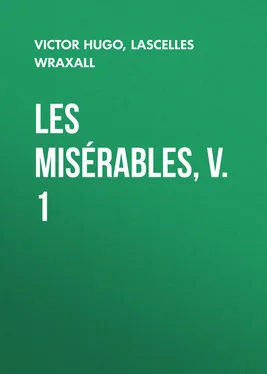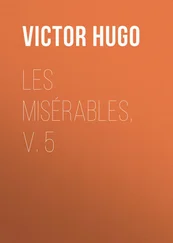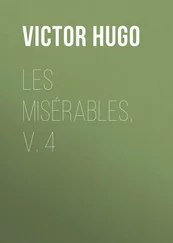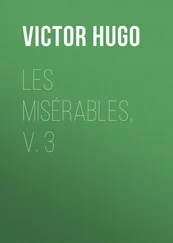Lascelles Wraxall - Les Misérables, v. 1
Здесь есть возможность читать онлайн «Lascelles Wraxall - Les Misérables, v. 1» — ознакомительный отрывок электронной книги совершенно бесплатно, а после прочтения отрывка купить полную версию. В некоторых случаях можно слушать аудио, скачать через торрент в формате fb2 и присутствует краткое содержание. Жанр: literature_19, foreign_antique, foreign_prose, на английском языке. Описание произведения, (предисловие) а так же отзывы посетителей доступны на портале библиотеки ЛибКат.
- Название:Les Misérables, v. 1
- Автор:
- Жанр:
- Год:неизвестен
- ISBN:нет данных
- Рейтинг книги:4 / 5. Голосов: 1
-
Избранное:Добавить в избранное
- Отзывы:
-
Ваша оценка:
- 80
- 1
- 2
- 3
- 4
- 5
Les Misérables, v. 1: краткое содержание, описание и аннотация
Предлагаем к чтению аннотацию, описание, краткое содержание или предисловие (зависит от того, что написал сам автор книги «Les Misérables, v. 1»). Если вы не нашли необходимую информацию о книге — напишите в комментариях, мы постараемся отыскать её.
Les Misérables, v. 1 — читать онлайн ознакомительный отрывок
Ниже представлен текст книги, разбитый по страницам. Система сохранения места последней прочитанной страницы, позволяет с удобством читать онлайн бесплатно книгу «Les Misérables, v. 1», без необходимости каждый раз заново искать на чём Вы остановились. Поставьте закладку, и сможете в любой момент перейти на страницу, на которой закончили чтение.
Интервал:
Закладка:
"Who's there?" the landlord asked.
"Some one who wants a supper and bed."
"Very good. They are to be had here."
He went in, and all the topers turned to look at him; they examined him for some time while he was taking off his knapsack. Said the landlord to him, "Here is a fire; supper is boiling in the pot: come and warm yourself, comrade."
He sat down in the ingle and stretched out his feet, which were swollen with fatigue. A pleasant smell issued from the caldron. All that could be distinguished of his face under his cap-peak assumed a vague appearance of comfort blended with the other wretched appearance which the habit of suffering produces. It was, moreover, a firm, energetic, and sad profile; the face was strangely composed, for it began by appearing humble and ended by becoming severe. His eyes gleamed under his brows, like a fire under brushwood. One of the men seated at the table was a fishmonger, who, before entering the pot-house, had gone to put up his horse in Labarre's stables. Accident willed it, that on the same morning he had met this ill-looking stranger walking between Bras d'Asse and – (I have forgotten the name, but I fancy it is Escoublon). Now, on meeting him, the man, who appeared very fatigued, had asked the fishmonger to give him a lift, which had only made him go the faster. This fishmonger had been half an hour previously one of the party surrounding Jacquin Labarre, and had told his unpleasant encounter in the morning to the people at the Cross of Colbas. He made an imperceptible sign to the landlord from his seat, and the latter went up to him, and they exchanged a few whispered words. The man had fallen back into his reverie.
The landlord went up to the chimney, laid his hand sharply on the man's shoulder, and said to him, —
"You must be off from here."
The stranger turned and replied gently, "Ah, you know?"
"Yes."
"I was turned out of the other inn."
"And so you will be out of this."
"Where would you have me go?"
"Somewhere else."
The man took his knapsack and stick and went away. As he stepped out, some boys who had followed him from the Cross of Colbas, and seemed to have been waiting for him, threw stones at him. He turned savagely, and threatened them with his stick, and the boys dispersed like a flock of birds. He passed in front of the prison, and pulled the iron bell-handle; a wicket was opened.
"Mr. Jailer," he said, as he humbly doffed his cap, "would you be kind enough to open the door and give me a nights lodging?"
A voice answered, "A prison is not an inn; get yourself arrested, and then I will open the door."
The man entered a small street, in which there are numerous gardens, some of them being merely enclosed with hedges, which enliven the street. Among these gardens and hedges he saw a single-storeyed house, whose window was illuminated, and he looked through the panes as he had done at the pot-house. It was a large white-washed room, with a bed with printed chintz curtains, and a cradle in a corner, a few chairs, and a double-barrelled gun hanging on the wall. A table was laid for supper in the middle of the room; a copper lamp lit up the coarse white cloth, the tin mug glistening like silver and full of wine, and the brown smoking soup-tureen. At this table was seated a man of about forty years of age, with a hearty, open face, who was riding a child on his knee. By his side a woman, still young, was suckling another child. The father was laughing, the children were laughing, and the mother was smiling. The stranger stood for a moment pensively before this gentle and calming spectacle; what was going on within him? It would be impossible to say, but it is probable that he thought that this joyous house would prove hospitable, and that where he saw so much happiness he might find a little pity. He tapped very slightly on a window pane, but was not heard; he tapped a second time, and he heard the woman say, "Husband, I fancy I can hear some one knocking."
"No," the husband answered.
He tapped a third time. The husband rose, took the lamp, and walked to the front door. He was a tall man, half peasant, half artisan; he wore a huge, leathern apron, which came up to his left shoulder, and on which he carried a hammer, a red handkerchief, a powder-flask, and all sorts of things, which his belt held like a pocket. As he threw back his head, his turned-down shirt-collar displayed his full neck, white and bare. He had thick eye-brows, enormous black whiskers, eyes flush with his head, a bull-dog lower jaw, and over all this that air of being at home, which is inexpressible.
"I beg your pardon, sir," the traveller said, "but would you, for payment, give me a plateful of soup and a corner to sleep in in your garden outhouse?"
"Who are you?" the owner of the cottage asked.
The man answered, "I have come from Puy Moisson, I have walked the whole day. Could you do it, – for payment of course?"
"I would not refuse," the peasant answered, "to lodge any respectable person who paid. But why do you not go to the inn?"
"There is no room there."
"Nonsense! that is impossible; it is neither market nor fair day. Have you been to Labarre's?"
"Yes."
"Well?"
The traveller continued, with some hesitation, "I do not know why, but he refused to take me in."
"Have you been to what is his name, in the Rue de Chauffaut?"
The stranger's embarrassment increased; he stammered, "He would not take me in either."
The peasant's face assumed a suspicious look, he surveyed the new comer from head to foot, and all at once exclaimed with a sort of shudder, —
"Can you be the man?.."
He took another look at the stranger, placed the lamp on the table, and took down his gun. On hearing the peasant say "Can you be the man?" his wife had risen, taken her two children in her arms, and hurriedly sought refuge behind her husband, and looked in horror at the stranger as she muttered, "The villain!" All this took place in less time than is needed to imagine it. After examining the man for some minutes as if he had been a viper, the peasant returned to the door and said: "Be off!"
"For mercy's sake," the man continued, – "a glass of water."
"A charge of shot!" the peasant said.
Then he violently closed the door, and the stranger heard two bolts fastened. A moment after the window shutters were closed, and the sound of the iron bar being put in reached his ear. Night was coming on apace: the cold wind of the Alps was blowing. By the light of the expiring day the stranger noticed in one of the gardens a sort of hut which seemed to him to be made of sods of turf. He boldly clambered over a railing and found himself in the garden; he approached the hut, which had as entrance a narrow, extremely low door, and resembled the tenements which road-menders construct by the side of the highway. He doubtless thought it was such: he was suffering from cold and hunger, and though he had made up his mind to starve, it was at any rate a shelter against the cold. As this sort of residence is not usually occupied at night, he lay down on his stomach and crawled into the hut: it was warm, and he found a rather good straw litter in it. He lay for a moment motionless on this bed as his fatigue was so great: but as his knapsack hurt his back and was a ready-made pillow, he began unbuckling one of the thongs. At this moment a hoarse growl was audible: he raised his eyes, and the head of an enormous mastiff stood out in the shadow at the opening of the hut, which was its kennel. The dog itself was strong and formidable, hence he raised his stick, employed his knapsack as a shield, and left the kennel as he best could, though not without enlarging the rents in his rags.
He also left the garden, but backwards, and compelled to twirl his stick in order to keep the dog at a respectful distance. When he, not without difficulty, had leaped the fence again, and found himself once more in the street, alone, without a bed, roof, or shelter, and expelled even from the bed of straw and the kennel, he fell rather than sat on a stone, and a passer-by heard him exclaim, "I am not even a dog." He soon rose and recommenced his walk. He left the town hoping to find some tree or mill in the fields which would afford him shelter. He walked on thus for some time with hanging head; when he found himself far from all human habitations, he raised his eyes and looked around him. He was in a field, and had in front of him one of those low hills with close-cut stubble, which after harvest resemble cropped heads. The horizon was perfectly black, but it was not solely the gloom of night, but low clouds, which seemed to be resting on the hill itself, rose and filled the whole sky. Still, as the moon was about to rise shortly, and a remnant of twilight still hovered in the zenith, these clouds formed a species of whitish vault whence a gleam of light was thrown on the earth.
Читать дальшеИнтервал:
Закладка:
Похожие книги на «Les Misérables, v. 1»
Представляем Вашему вниманию похожие книги на «Les Misérables, v. 1» списком для выбора. Мы отобрали схожую по названию и смыслу литературу в надежде предоставить читателям больше вариантов отыскать новые, интересные, ещё непрочитанные произведения.
Обсуждение, отзывы о книге «Les Misérables, v. 1» и просто собственные мнения читателей. Оставьте ваши комментарии, напишите, что Вы думаете о произведении, его смысле или главных героях. Укажите что конкретно понравилось, а что нет, и почему Вы так считаете.












